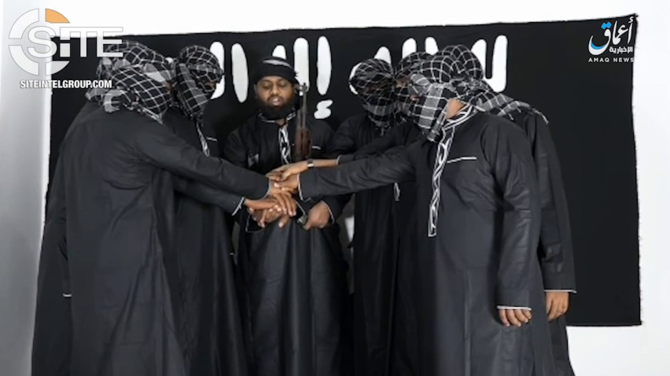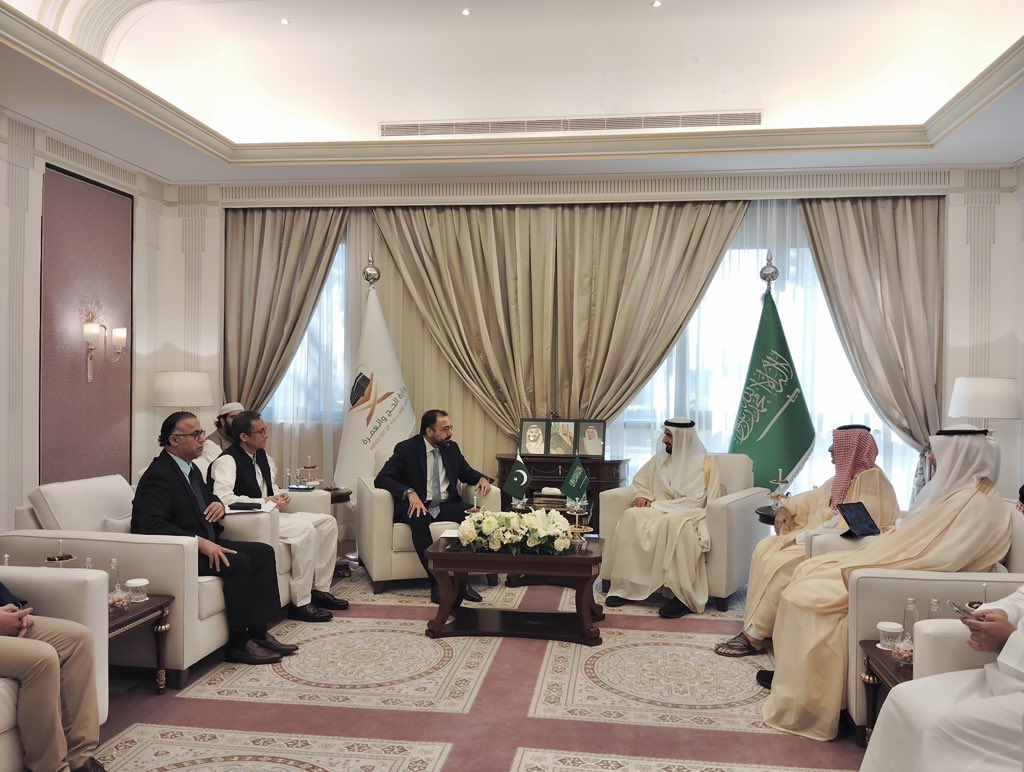ISLAMABAD: A video released by the Daesh militant group on Tuesday shows seven black-clad, masked men pledging allegiance to the organization. An eighth man whose face is visible leads them.
That man is believed to be Mohammed Zahran Hashim, a little-known radical preacher from Sri Lanka who investigators and experts increasingly believe masterminded the coordinated Easter Day attacks in Sri Lanka that have left 359 dead and over 500 wounded.
A statement released by Daesh on Tuesday claimed responsibility for the rash of Sunday bombings and threatened future attacks in both the Arabic and Tamil languages. The group also released a video of the eight bombers who allegedly carried out the attacks.
The video and the claim do not help clarify whether the bombers were core fighters from Daesh itself or members of local groups that have pledged allegiance to the transnational organization. The Sri Lankan government has previously said the attacks were the work of local Islamist group, the National Thowheeth Jama’ath (NJT). It has also named Jammiyathul Millathu Ibrahim (JMI), another Sri Lankan outfit.
Whatever the links between these local groups and Daesh, the claim suggests that the transnational group is still a threat despite the recapture of territory once held by it in Syria and Iraq. The claim has also once more raised serious concerns about the group’s growing clout in South Asia, reflected in the FBI, Interpol and other foreign intelligence services joining the investigation.
“Clearly a group as powerful as ISIS won’t go away quickly, and its role in this attack would suggest that it remains perfectly prepared to stage, or help stage, the deadliest attacks imaginable,” Michael Kugelman, senior associate for South Asia at the Wilson Center in Washington, told Arab news.
Daesh has built its network in a number of Asian countries like Afghanistan, Pakistan, the Maldives, the Philippines and Indonesia. In each country, it has worked by co-opting local militant outfits and individuals and using them to launch attacks.
In Sri Lanka, too, Daesh has been recruiting for years, said Rohan Gunaratna, a Singapore-based expert on militancy in the region: “Sri Lanka is the only country in Asia where ISIS has not carried out an attack despite having a network for a considerable amount of time.”
On the ground, Gunaratna said, Daesh had received considerable help from Zahran Hashim, a former member of the National Thowheeth Jama’ath who broke away and created the Al-Ghuraba group.
“That is the Islamic State [Daesh] branch in Sri Lanka,” Gunaratna said.
“ZAHRAN HASHIM, THE MAIN PLAYER”
Sri Lanka has no history of Islamist extremism. NTJ is one of the few Islamist radical groups operating in the country and was thus the main contender for co-option by Daesh.
A government official who declined to be named said the Jama’ath had split into three groups in 2016 because many of its followers did not approve of Zahran Hashim’s “extremist ideology.”
His increasingly hardliner and militant views, the official said, came from his growing “international connections and links with Islamic groups in Southern India.”
It is believed that Hashim received his early schooling in Kattankudy, his hometown in eastern Sri Lanka. Unconfirmed media reports say he traveled to India for a course on Islamic theology but dropped out midway. Since then, he has reportedly travelled frequently between India and Sri Lanka.
Last year, Hashim came on the radar of intelligence officials after some young men defaced three Buddhist statues in central Sri Lanka. Interrogations revealed that they were students of Hashim. That investigation also led officers to a large weapons cache, including 100 kilograms of explosives and detonators, on the northwestern coast of Sri Lanka.
Hilmy Ahmed, the vice president of the Muslim Council of Sri Lanka, said Hashim was turned away by the people and moderate clerics of his native Kattankudy because of his hardline views. It was then that he turned to YouTube.
Over the last two years, Hashim has gained thousands of followers for his impassioned sermons against non-Muslims on YouTube and a Sri Lankan Facebook account which he called Al-Ghuraba media and used to spread pro-Daesh propaganda.
According to Robert Postings, a researcher whose work focuses on Daesh, Hashim had been a supporter of the group at least since 2017 when he began posting pro-Daesh propaganda on Facebook. In many of Hashim’s videos, the backdrop is images of the burning Twin Towers after the September 11, 2001 attacks in the United States.
Experts with knowledge of the investigations said it was almost certain Hashim’s faction of the Jama’ath was the “main player” in the Easter attacks and that he had worked with the support of international players, given the unprecedented scale, sophistication and coordination of the bombings and the fact that foreigners were targetted.
“It’s hard to imagine that the attacks were purely domestic in nature,” said Taylor Dibbert, a Sri Lanka expert and fellow at the Pacific Forum.
“Most Sri Lankans have not heard about this [National Thowheeth Jama’ath] group before,” Jehan Perera, Executive Director of the National Peace Council of Sri Lanka, said. “We would think they could not have the power to coordinate by themselves, there is someone behind them, a handler.”
“SPECTER OF VIOLENCE”
Sri Lanka endured several suicide bombings targeting government officials and installations during a long civil war against ethnic Tamil separatists that ended in 2009. Since then, the country has existed in relative calm.
After a lull in violence for ten years, the trauma and anger over Sunday’s suicide bombings has been exacerbated as it has become apparent that top officials ordered no security arrangements despite threats of violence.
Since the end of the insurgency, official buildings and places of business and worship have operated in Sri Lanka largely without security. In Colombo, the capital, one could walk into a hotel without any security checks.
“Sri Lanka was an easy target,” Perera of the National Peace Council said.
A history of insurgency also means it was possible that Daesh’s local recruits had access to weapons and explosives leftover from the earlier conflict.
But most importantly, experts said, those behind the attack had local knowledge of the deep dysfunction within the Sri Lankan government, and had exploited it.
According to an April 11 intelligence report seen by Arab News, police had received a tip-off of a possible attack on churches by the Jama’ath group this month. Reuters also reported that Indian intelligence officers contacted their Sri Lankan counterparts two hours before the first attack to warn of a specific threat on churches.
A government minister said Prime Minister Ranil Wickremesinghe had not been informed about the warnings and had been shut out of top security meetings because of a feud with President Maithripala Sirisena.
Sirisena fired Wickremesinghe last year only to be forced to reinstate him under pressure from the Supreme Court. Their relationship is reported to be fraught.
“The fact that the threat of an attack was known well in advance of Sunday yet didn’t lead to any efforts to preempt it suggests that you didn’t have people communicating with each other on high levels,” said Kugelman.
“This government dysfunction, driven by tensions between the president and prime minister, could be something that the militants sought to exploit. In effect, they knew that they’d have a greater chance to pull off this horrific act because a hamstrung government wouldn’t be in a position to prevent it.”
The next few weeks will be critical for Sri Lanka as experts fear that festering tensions between Buddhists and Muslims could explode, raising the specter of Sri Lanka descending into violence. Stray incidents of attacks on Muslim-owned property have already been reported in the last three days.
“The government will need to step up and try to bring together a grieving nation at risk of becoming more divided,” Kugelman said. “And that won’t be an easy task for an administration that is itself deeply divided.”
Dibbert added: “The government needs to conduct a thorough, transparent investigation in order to fully understand what transpired on Easter. A heavy-heavy handed response targeting ethnic or religious minorities would exacerbate tensions and further destabilize the situation.”

















